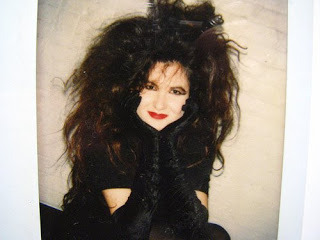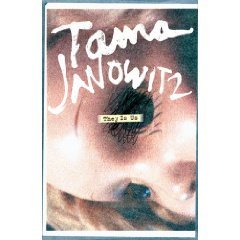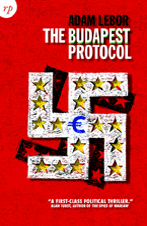Matt Rees's Blog - Posts Tagged "futuristic"
The Queen of Quirky: The Writing Life interview with Tama Janowitz

Tama Janowitz has always been great at first lines (Remember her Slaves of New York opened with this: “After I became a prostitute, I had to deal with penises of every imaginable shape and size.”) Her new novel, they is us, will be out in September in the U.S. (It’s already published in the UK by The Friday Project) and she strikes again with a first paragraph that seems to carry all our fears of a technologically mutated future and our present discontent with a changing world: “Years pass. There are still thimbles and Unitarians. The world is the same as it has always been, maybe a little worse. It’s a beautiful summer day, kind of, although violent electrical storms are predicted for later – if not that day, then sometime. And the news, too, is much the same: 40 percent of people can’t sleep; a type of bustard believed to be extinct has been found; war continues.” It’s an astonishing novel, its weird quirkiness a mask for a powerfully grounded nuts-and-bolts skewering of modern society. You may gather from Tama’s interview with me that she could’ve easily titled the book dystopia is tama. In fact, she unveils some astonishing points about how difficult it is simply to life a Writing Life.
Would you recommend any books on writing?
I always liked to read books on ‘how to write’; for some reason I found them very soothing and encouraging. I could not recommend one in particular, it was a long time ago but I did used to buy them. I think John Brain wrote one? I liked it.
What’s a typical writing day?
I used to be able to get up and get to work right away and I would give myself x number of words or pages to write. Every year it took me longer and longer and more and more procrastination on my part and fewer words. I find having a computer helps in some ways – you can change a character’s name just by typing ‘replace all’ but at the same time I keep checking my e-mail etc. and finding other things to do before settling down which nowadays is usually not until close to noon. I used to write seven days a week. Now I do not write on the weekends; I am like a huge slug or larvae, in bed and surrounded by small dogs (I have eight) and they want to go out but either it is too cold or too hot or it is raining or . . .
Plug your latest book. What’s it about? Why’s it so great?

This book is called they is us. I like the pictures in it because I chose them. I like to color them in with soft color pencils. And I like to put some sticky mirrored paper on the front and back covers. You can buy this kind of paper on Canal Street in New York! They have all kinds of shiny paper in this store. I like the type that is silver with kind of holographic little squares. Also I like that it is a book with a front cover and a back cover and pages in between, that way I can look at it and think to myself, hey I wrote a book! And I got it published! Sometimes that makes me feel kind of good.

How much of what you do is:
a) formula dictated by the genre within which you write?
I would like to write a genre novel that would be popular but I don’t know how and it wouldn’t turn out right anyway or probably I would get bored and not finish it.
b) formula you developed yourself and stuck with?
I sure wish I had a formula and could stick with it. I don’t know what the formula would be.
c) as close to complete originality as it’s possible to get each time?
I don’t think it possible to be completely original and there is no such thing since we have to use things like ‘“oh no, you’re kidding!” he said.’ But I hope I can be a little bit fresh in my use of language or characters and style.
Who’s the greatest stylist currently writing?
There have been many great stylists and all different, Nabokov who could sling a sentence like a rope of rubies and strangle you with its brilliance. Or Virginia Wolff – the first to write as if really inside the person’s or people’s heads. But one kind of style does not negate another and as for today’s greatest stylist, I suppose there could be many, I do not keep up with or read that much current fiction.
Do you have a pain from childhood that compels you to write? If not, what does?
I do not know what compels me to write. I do not have a childhood pain or at least no more than anyone else. I do not like to write and I do not make any money off writing and I do not have any readers but a few and I have many nasty things written about my writing and I find writing depressing and boring but I keep writing and I do not know why.
What’s the best idea for marketing a book you can do yourself?
I really would not know. My first book American Dad did not sell any copies and when my next book Slaves of New York was published whenever they telephoned me from the publisher to say so and so wanted to interview me, I said, ok, because it had been so hard to sell my second book since my first book hadn’t sold and I kept writing books but nobody would publish them and so I switched to short stories because they took less time to write and get rejected but then the New Yorker started publishing me and then a company did want to publish a book of my short stories. So I always did what they asked me to do, they hired a company to make a short video of me and then I kept doing whatever they asked me to do. Then I did some advertisements. I was broke and I had only received three thousand five hundred dollars for that book. However then the press and people said I was out for publicity. And they said ‘a real writer would not do advertisements.’ There were editorials in the newspaper about my evilness. However nowadays not only are many writers making their own videos for Youtube to promote their books, over the many years before me authors who did commericals/adverts were: Fitzgerald, Faulkner, Steinbeck, Hemingway (whisky I think) Lillian Hellman; John Irving (am-ex); Norman Mailer (Trump Airline) and then after me Joan Didion did an ad (The Gap) and many others. Then a nasty little writer did an interview and called me a ‘whore’ for doing adverts. He said he had been asked to do adverts but he would not do so! Of course he had many many rich wives to support him, so I guess he didn’t need to!
What’s your experience with being translated?
I do not speak or read another language fluently enough to be able to tell how well or poorly a book of mine has been translated. Once someone began reading Kafka’s Metamorphosis in original German and I was stunned at the sound of the words and how much richer it sounded in German than English. I know that the couple who recently did a new translation of ‘Anna Karenina’ gave that book a whole new life and probably a lot of books have lost a lot in translation – people sometimes tell me ‘such-and-such’ a translation of one of my books was good or bad. It is hard for me to care however since in all these years I never got any royalty check beyond the original one or two thousand for initial rights of a book being sold. I figure what you get up front is all you are ever going to get; but since I do not take an advance but must write on my own first, I do not get any money – because publishers want to give you money based on an ‘idea’ but are always disappointed by what you end up writing. The only exceptions to this are a first time novelist who has already finished a book but does not have a track record – publishers will jump on this – or a book from the p.o.v. of a different culture – say, an Iraqi growing up in London or a Chinese person in Canada or . . . etc. etc. These books – let’s say, a girl from Jamaica writing about her family’s history and moving to the USA – are what get the Pulitzer and other prizes these days.
Do you live entirely off your writing? How many books did you write before could make a living at it?
I made a living from my writing for about three years. Before that I just kept at it and would get very tiny amounts here and there from small prize or small publication; then after I no longer made any money fortunately my husband did start to make money and he has been very, very kind and supportive emotionally and financially – I still have hopes that someday I might once again make a few dollars. For at this time had I spent the last 28 years working at McDonalds I would have earned more on a per annum basis.
How many books did you write before you were published?
I did write a few books before I got published as I had read that Doris Lessing wrote five books before she got ‘the first’ published. In my case though my first book American Dad did get published first in 1981, however, then some of the other earlier books I put into a drawer, I chopped up into stories
What’s the strangest thing that happened to you on a book tour?
Many things have happened but one thing that stands out is I was in Minneapolis and there were three people who came to hear me read/speak and there were many, many chairs set up and the staff disappeared and then the fourth person arrived and he resembled a murderer or serial killer and he sat in the front row and he had a metallic suitcase and I began to read and he opened his suitcase and I thought now he will take out a gun or knife. But instead he took out a book and began to read it. But it was not my book and he was not reading along to himself with what I was reading. It was a completely different book by a different person.
Another time I had a publicist from the company who sent me out on a ‘book tour’ only she did not book me in any media or readings and so I went from city to city picked up by an escort and then sat in the hotel; sometimes the escort would wonder why the publicist had not booked me on various tv shows/interviews etc that would have been happy to have had me. When I mentioned to the publicist that I wasn’t doing anything but sitting in my hotel she began to scream at me at the top of her lungs that it was all my fault.
What’s your weirdest idea for a book you’ll never get to publish?
I do not have weird ideas, I have regular ideas but they don’t come out normal.
Review: The thriller that reminds us why Euro politics matter

The Budapest Protocol, by Adam Lebor
(Reportage Press)
Sometimes a journalist comes across something so powerful that it seems bigger than the project he’s researching. Usually it’s put aside to serve as the basis for a future project, a magazine article or another nonfiction book.
Sometimes it takes such a grip on the writer’s imagination that there’s only one way to go. The novel. I know, because it’s how I turned from Middle East correspondent to the author of Palestinian crime fiction. Journalism seemed so limited by comparison, so unlikely to grab people and tell them “Pay attention, this really matters” the way a novel can.
That’s what happened to Adam Lebor in 1996 when he was researching his acclaimed “Hitler’s Secret Bankers: How Switzerland Profited from Nazi Genocide.” He stumbled upon a World War II intelligence dossier addressed to the US Secretary of State. It detailed a French agent’s report on German contingency plans for the economic takeover of Europe, should the Third Reich fail.
Lebor asked himself the question: what if the industrialists who intended to found this Fourth “economic” Reich had tried to do so, after the war? What if they had succeeded? (“What if,” as Stephen King notes in his “On Writing,” is the best place from which to start a thriller.)
From his vantage point as a correspondent based in Budapest, Lebor was able to see the massive inroads amounting more or less to takeover of post-Soviet economies by German and Austrian conglomerates. Add to that the growing centralization of the European Union and the introduction of its single currency forcing the economies of most of Europe to toe a single line, and you start to see why the Red House Report gripped him so.
The result is the chillingly real thriller “The Budapest Protocol,” published in the UK this month.
Alex Farkas, a local journalist, uncovers the economic conspiracy, which – as the novel unfolds – is focused on the election campaign of one of the conspirators as President of Europe (a post that many Brussels types would gladly see become reality). Farkas discovers plans for a new Holocaust against the Gypsies, which with the rise in these poor economic days of a neo-Nazi right-wing in Hungary is another of the novel’s moments of eerie realism.
What really drives Farkas, though, is the sinister murder of his grandfather, a survivor of the Budapest ghetto and a former dissident. That gives the novel the personal underpinning that elevates it above pure conspiracy theory. In fact, it makes it a first-rate thriller comparable to Robert Harris’s “Fatherland.” The novel reminds us that the politics of Europe remains more charged than the dull image the Brussels technocrats have lulled us into.
I’ll bet you’re sorry now you didn’t vote three weeks ago in the Euro elections. You will be after you read this novel.
Published on June 21, 2009 05:21
•
Tags:
budapest, crime, department, eastern, europe, fiction, futuristic, germany, hungary, jews, journalism, nonfiction, reviews, state, thrillers



